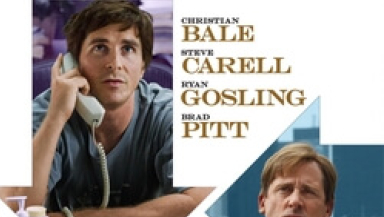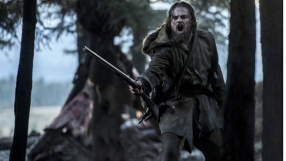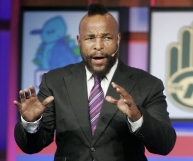
Shocked disbelief. That's the reaction that many cinema-goers will have to The Big Short, Adam McKay's major Oscar contender about the mid-noughties subprime mortgage scandal. Not because of its brilliance as a piece of film-making – although in flashes it is truly great – but because of the realisation that the story it tells is actually true. If it was a work of fiction, the story of a corrupt banking system which sleepwalked into near-total meltdown, and somehow got the taxpayer to foot the bill would simply be too far-fetched to be compelling.
But the story is absolutely, ridiculously, painfully true; in fact, the film even makes a point of telling us when any artistic license has been used. We join it when eccentric hedge fund manager Michael Burry (a good-as-he's ever been Christian Bale) starts to spot evidence of a massive American mortgage bubble and asks the big banks to allow him to essentially bet against (or 'short') the housing market. As he places these multi-million dollar 'bets' at the largest investment banks, the bankers can barely contain their scoffing laughter as they gleefully take his money; after all, Burry is investing in the sort of crash that has never happened before. Soon though others pick up the trail, a collection of "outsiders and weirdos" who think that against all the presenting evidence, Burry might be correctly predicting an unprecedented financial collapse. Wall Street continues to laugh in their faces and happily accept their investments. But since this is a movie about recent history, we're all in on the joke – this is the small group of men which correctly predicted what no-one else could see; and became handsomely wealthy as a result.
The film's cast list reads like a Who's Who of Hollywood's male leads. Steve Carrell provides further evidence that he's a serious actor; Ryan Gosling is hilariously over-the-top as a cartoon greed-monster; Brad Pitt seems to be turning into Robert Redford as he plays a sort of banking Obi Wan Kenobi. The performances are uniformly excellent, helped by a writer-director who is prepared to spend time properly drawing his characters. Perhaps the film's most remarkable success is that it manages to have us rooting for wealthy bankers who stand to become even richer by the film's conclusion, but McKay manages to make them human, compassionate and jarringly honest in the midst of a fraudulent industry.
McKay is only too aware that his subject matter is potentially dull for a mainstream popcorn audience; at heart it's about the intricacies of mortgage financing after all. So he takes on the challenge of fascinating his audience with gusto, using a series of tricks: celebrity cameos, fourth-wall shattering quips to camera and at one point even an alligator. The storytelling is frequently innovative, in particular through the startling use of still images, interspersed throughout to set the historical tone; first of bling-encrusted rappers and pre-recession excess, then of the real victims of the eventual disaster, the men, women and children who lost homes, jobs and savings because of an unregulated banking industry gone rogue.
In many senses then, The Big Short absolutely lives up to the awards hype. It's a great example of good storytelling, filled with great performances, creatively shot and backed by a brilliant soundtrack. Yet it has one major flaw, and given the creative talent involved, it again had me shaking my head in disbelief as it emerged. You'll notice so far I've mentioned only men; that's because the film features barely any female characters. In fact, the film has a very troubling view of women. The producers may argue that – much like fellow Oscar contender The Revenant – this is a true story where the real-life protagonists all happened to be male, but at least the Leonardo DiCaprio movie is set in the 1820s. The Big Short places us in 2005. Yet throughout the film, women are either invisible, or portrayed as fools, sex objects or foolish sex objects. The wife of Steve Carell's character is the one exception, and her only role in the film is to be Steve Carell's Wife.
You might think I'm exaggerating or being over-sensitive; I'm not. At one point, the Ryan Gosling character informs us that since the complex financial systems involved in the film are a bit dull and complicated, they're going to be explained to us by (actress/model) Margot Robbie in a bubble bath. And then, incredibly, that's exactly what we get. A beautiful, naked blonde, modesty covered only by soap, talking to us about subprime lending; it's as if the Bechdel Test never existed. Perhaps the film believes it's being really clever, empowering and post-modern at this point. Actually I think it's letting itself down pretty badly.
The other element of the film which some might find troubling is the language. Many modern writers seem to relish peppering their scripts with f-bombs (and worse), The Big Short does so to a point where even in that context, we notice it. The elderly couple next to me, who clearly thought they'd signed up for a 1970s-style conspiracy movie, left about halfway through for exactly this reason (although to be fair they'd already been pretty traumatised by the 'Dirty Grandpa' trailer). If constant swearing spoils your enjoyment of a movie, then you're going to find it pretty hard to overlook here.
Putting those criticisms to one side, The Big Short is still a fabulous movie, and makes deep and important points that hit at the very foundations of Western capitalism. It's a film with something profound to say about greed and power, and how they feed and enable one another; it ends with a portentous warning that we could be heading for exactly the same sort of crash again as we refuse to learn our lessons. As the final moments reveal that while the bankers largely managed to retain their wealth, the impact on the average American was often devastating, the audience feels like it's received a collective punch in the stomach. So The Big Short ends up being a Message Film that's hugely impressive, and very powerful, but which - just like the mortgage market of its subject - is seriously undermined by a flaw no-one expected.
Martin Saunders is a Contributing Editor for Christian Today and the Deputy CEO of Youthscape. You can follow him on Twitter: @martinsaunders

















